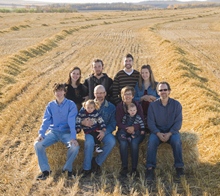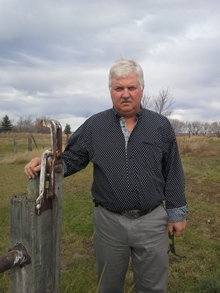Organic Livestock Pioneer
Honoured at Organic Connections 2012
Dr. Donald Johnson and his wife Nellie farm south of Fleming SK. They run a mixed farm of purebred Hereford cattle, hay and grain. Even before certification was available Doc farmed his land in the fashion we now term organic. Doc had a very active veterinarian practice for years, serving the Moosomin region until his retirement. At the age of about 75, Doc went back to school in Brandon to take a course while still actively farming in Moosomin. Doc and Nelly live an abundant life, offering advice as requested, making annual trips afar and impressing their family, neighbors and many friends far and wide with their wisdom and knowledge about soil health, organic livestock, personal health and sustaining yourself from your own organic garden and farm production.
Organic Industry Builder
Honoured at Organic Connections 2012
Alvin Scheresky, a pioneer of organic agriculture in Saskatchewan, began farming organically the Oxbow area in 1964. He was one of the first organic farmers in North America to have production facilities on the farm to process and add value to grains, and he operated the first organic flour mill in the province. He helped found the first Saskatchewan chapter of the Organic Crop Improvement Association. Scheresky actively promoted organic agriculture and assisted scores of aspiring organic farmers, who benefited from his extensive knowledge of polycultures, seeds, and methods for managing soil organic matter, moisture balance, and pest control.

Honoured at Organic Connections 2014
The Loiselle family manages their intergenerational family farm which is located 50 kms northeast of Saskatoon, SK at Vonda, which is in what is known as the Trinity region. They grow cereal, oilseed, pulse, clover and hay crops; and raise chickens, goats and rare breed cattle.
They have worked with certified organic & biodynamic management practices since 1985. The farm has been in the Loiselle family for 108 years. They have had a lead role in the renaissance of Red Fife wheat, the same hard red spring wheat that their great grandparents first grew on their homesteads in south western Manitoba then here in Saskatchewan. Their family has given it new life and it is the mainstay of their farm.
Marc has been involved in numerous initiatives in the organic movement starting with chairing the certification committee for Saskatchewan’s first organic marketing cooperative in the mid 1980s. During that time he also responded to numerous requests from other farmers seeking alternatives to the pitfalls of chemical based agribusiness. He worked on the Canadian organic standards and had represented organics on the wheat-rye-triticale recommending committee for the variety registration system in Western Canada. He served as president, secretary, treasurer and on the certification review committee for OCIA SK#2 Chapter. The Loiselles are currently members of the OCIA Chapter #5. Marc is on the steering committee for Slow Food Saskatoon, Saskatchewan’s first Slow Food convivium. Marc & Anita are active within the provincial francophone community in promoting the concept and establishment of terroir, where organics is certainly an important element.
The Loiselles are long time National Farmers Union members; and in supporting the United Nations’ International Year of the Family Farm (2014) agree wholeheartedly with the NFU Women’s President Joan Brady “…that family farms should be the primary unit of food production. It is the commitment of those families to both their communities and their environments that are necessary to provide Canadians and the rest of the world with safe, nutritious food.”
The Loiselles have been outstanding advocates for organic farming and have spread the word in a number of publications and documentaries, including The Future of Food, Life Running Out of Control and The Fight for True Farming.
Marc was involved in the class action lawsuit against Monsanto and Bayer Crop Science for releasing genetically modified canola; where he served as communications and research director for the Organic Agriculture Protection Fund. This led him to be invited several times to travel to Europe to testify in court in France in 2003; and in 2002 to Germany, Austria and Switzerland with Anita to lobby against the dangers of genetic engineering in agriculture.
In 2007, Marc received the OCIA’s Research & Education Farmer of the Year award. Marc is of the fifth generation of the Loiselle family to farm their land. Marc & Anita have four children proud to be raised on an organic farm and striving to live as healthy as possible. Marc & Anita are now also happy grandparents too, and the family is ever growing. Despite their own successes and struggles, they are willing mentors for other farmers transitioning into organic farming. They truly embody their farm motto: Holistic Stewardship for Abundant Life.

Honoured at Organic Connections 2014
I started farming with my Dad, Wilfred, in 1982. We came back to live and farm my Great-Grandfather’s 1907 homestead. In 1990, as a family, we decided that organic farming was the direction in which we wanted to take our farm. My son, Bryce, is now living on his Grandfather’s land, in hopes of being able to farm fulltime.
The first two years we were certified with OCIA Chapter #2, northwest of North Battleford. The third year we joined Chapter #8 because of the similarity of soil type and farming practices. We certified our livestock in the late 1990’s.
I served on the certification committee for 10 years; three of those as chairperson. At that time the certification committee did the actual certifying. We have since moved to third party certifiers. I also received Farmer of the Year Award from OCIA International in 2010.
Through the years we have seeded many types of crops. One year we grew 12 varieties. Some of the crops we have grown were fenugreek, hemp, lentils (green, red, brown, black), brown and golden flax, hard red spring, durum, CPS white, barley, oats, peas (forage, green and field), kamut, soybeans and chickpeas. We tried diverse crops and rotations to access niche markets. We used to have to hunt for markets but now the buyers come to us.
We also tried many biological soil amendments to boost microbial life in the soil. We took our turns hosting field days to share our results. This year I hired a certified agronomist who specializes in organic solutions. His enthusiasm has been motivating.
At first we decided that organic farming was a way of making small acres viable in supporting two families. As we got more involved, organic farming became our life choice. This was the way we chose to live and raise our family. Taking care of the environment and soil was our alternative to mining our farmland. I feel conventional farmers use soil as a medium to hold their plants up whereas we use our soil to grow our plants. Even if there were no organic markets I would still farm organically and then sell conventionally, if necessary. The driving force behind how we farm is sustainability.










